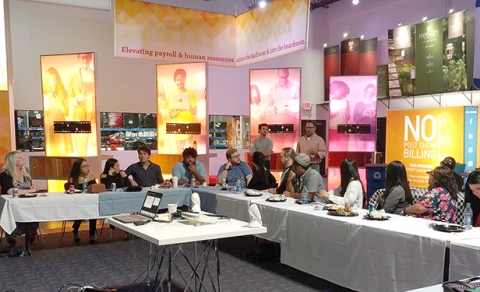TradeTec Mentors College Students to Help Develop Next Generation of Exhibit Designers

As a full-service trade show exhibit provider, TradeTec Skyline relies heavily on the creative talent of professional designers. Yet, it goes without saying that a creative industry can’t survive without new generations of young professionals moving into the field.
To keep its industry thriving, TradeTec makes a practice of giving back to the design community by fostering the development of up-and-coming designers via regular educational events designed to teach college students how to take their education into the professional world, as well as inspire them to apply for the company’s design internship program.
Earlier this month, TradeTec and its entire design team hosted 25 graphic design students from The Illinois Institute of Art – Schaumburg (ILIA) at its Lombard, Ill., facility for a day of industry education and candid presentations focused on making the transition from students to professionals.
“When you take students outside of the classroom, bring them into your facility and your world, it becomes impactful and they tend to ‘hear’ what we are saying,” explained Chris Ybarra, TradeTec creative director and 2004 ILIA graduate, who coordinated and developed the student involvement program four years ago.
He continued, “Our mission isn’t to teach them strictly about design and design trends. We want to teach them about what it’s like to be a designer in a professional setting, (including) how to set career goals, how to manage time and work within a business where you are interacting with different departments and clients. Also, what questions you should ask in an interview when you are trying to find the company to start your career. At the end of the day, we want them to learn from the mistakes and failures we had along the way to ease their transition process.”
At TradeTec’s most recent student event, Ybarra shared his expertise regarding effective discovery meetings, designing to client expectations and understanding business process, while Matt Franklin, graphic designer and 2016 ILIA graduate, shared a candid account of his recent transition from student to professional designer and conducted an open Q&A session with some of his former classmates.
In addition, Abby Georgacopoulos, director of marketing and 2004 ILIA graduate, presented tips on time management and professionalism as opportunities to help accelerate career growth.
The students then participated in a live design challenge in which they created structures using common food and office items to test their three-dimensional creative thinking.
Since the program’s launch, TradeTec has hosted close to 100 ILIA students via one large and several small organized groups each year.
Additionally, individual students are given the opportunity to come in for a day and shadow the design team, according to Ybarra, who said he would have found this kind of mentorship invaluable when he was a design student.
“While I had phenomenal instructors at the Illinois Institute of Art – Schaumburg, sometimes as students we didn’t always want to ‘hear’ what they had to say – they were working professionals in the creative field, but we still saw them as our instructors,” Ybarra said.
He continued, “I always thought that if I had someone on the outside giving me advice and honest feedback, maybe I would have made better career choices and would have been better prepared with the skills I needed to succeed. As this program has developed, I work hand-in-hand with (ILIA) instructors to identify what the industry is calling for with our future designers.”
To date, TradeTec’s mentorship activities have resulted in four ILIA students entering the company’s internship program, which typically focuses on graphic design, designing for trade shows and wide format printing.
“Our interns are not running to get us coffee – they are in the middle of our everyday chaos,” Ybarra explained.
He continued, “We teach them not only the basics of design but also how to be in a meeting with a client and how to interact with them. They are working on actual client projects and get to present their concepts. Our clients have been very welcoming of working with the students and get excited to be a part of their growth. The accountability of being a professional and working within a professional environment are what the students appreciate the most, as it gives them completely new perspective. Being a successful designer isn’t just about how well you can design.”
As if running TradeTec’s student program and sitting on the ILIA advisory council isn’t enough, Ybarra also mentors junior and senior-year students through the EDPA Mentorship program, further evidence of his determination to inspire young designers to contribute to an industry that has given him so much in his 13 years as an exhibit design professional.
“If we can all share our wealth of knowledge and expertise with each other, the world would be a better place,” Ybarra said.
He continued, “I feel I owe it to the future designers to help foster their passion and give them the best chance possible to succeed and do what they love. As leaders in our industry, we should selfishly want the best-of-the-best to come to our industry and create beautiful designs. We want them to challenge us and to keep us on our toes and mutually push each other to be better. They will make us all better, so why not give them a head start?”


Add new comment